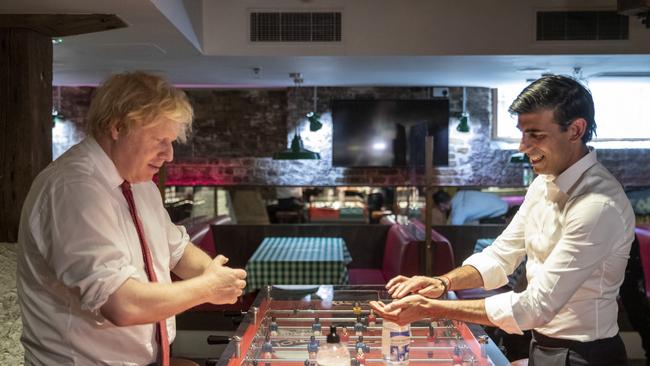Boris Johnson must summon spirit of optimism to bring Britain back from COVID-19

Johnson has taken back control from the scientific advisers — who have been unable to resolve their lively disagreements — and put his faith in the British public. This includes moving towards a voluntary system, rather than asking police to enforce edicts.
A study found only three countries have been more reluctant to leave lockdown than Britain — Nicaragua, Algeria and Iran. It’s a sad state of affairs, but it reflects the failures of recent months.
Britain has suffered the most COVID-19 deaths in Europe, and is also facing the worst economic hit. The government put a lot of faith in lockdown as a drastic tool that would at least leave Britain with fewer deaths than countries that were then further along the epidemic curve. It is hard to argue this strategy was a success. And while no country has covered itself in glory, Britain comes out worse than anywhere in opinion polls asking how well the government has handled the crisis.
In the House of Commons last week, Johnson said it would be a waste of time for an inquiry to pore over what went wrong. On the contrary, it would be very valuable to see what lessons can be learned, as they can inform his policy now.
At the start of this epidemic, we only had theory, drawn from Chinese data. One theory, advanced by Imperial College London’s Neil Ferguson, was that the virus would grow exponentially until there was lockdown. Terrifying numbers were produced. It was guesswork from computer modelling and it was also, at the time, the only guide. But it was wrong.
We can now replace theory with evidence, not just from Britain but the rest of the world. Take the idea that Britain has paid the price for delaying lockdown. If this were the case, we would see a correlation between countries that locked down first and those that had the fewest deaths. Italy, Spain, France — all of which went down the full lockdown route — have suffered some of the highest death rates. South Korea, Japan, Germany all imposed much lighter restrictions on their citizens but have had far lower death rates. Sweden, damned by many for its laissez-faire approach, still has a lower death rate than Britain.
Everywhere, now, lockdown is being successfully ended. From South Korea to Germany, local outbreaks are dealt with by local measures. Much of the concern about rising infections in the US is misplaced. States such as Arizona, Utah, Wyoming and Oklahoma are seeing their first wave, not their second. They are experiencing what other states went through in April. But still, they are choosing not to lock down and are taking other measures instead. By avoiding basic mistakes (such as sending elderly hospital patients to care homes) they have every chance of keeping the virus under control.
Lockdown was a tool chosen by countries that did not know how deadly the virus would be, nor how it would behave. Armed with more knowledge, countries can now react in a more measured way. A critical look at the past few months will reveal that Johnson was right, originally, to think that the virus could be controlled by voluntary action, because people react quickly and sensibly to requests. People were washing their hands, minimising contact and travelling less. Mobility had halved by lockdown on March 23, although this was not known at the time.
Johnson’s instinct has always been to trust the public. Ever since he was persuaded to abandon his original idea and go for a police-enforced lockdown, he has looked miserable and unimpressive. All the more so since it became clear that the lockdown experiment had failed to reduce mortality to the extent that he had been told it would. His own near-death experience will have had an effect, but so will seeing the national death toll surpass 50,000. Gimmicks such as the 14-day quarantine for new arrivals — imposed months after lockdown — make no practical sense and are a sign of panic. To persist with policies because they poll well is not a sign of a confident government.
After the failures of the past few months, Johnson must now start to rebuild. Chancellor of the Exchequer Rishi Sunak will present a mini-budget next month, in which the objective must be to lower taxes and cut regulations to kickstart the recovery. It is one thing to open shops, and another to persuade people to go to them.
For weeks, people were informed by adverts that leaving home could have dire, perhaps fatal consequences. These warnings worked — perhaps too well. A great many people will need encouragement to get back into the normal swing of things.
At present, COVID-19 is seen in Britain as a public health crisis. As COVID infections fall — with asymptomatic infections being the norm — it will come to be seen as an economic crisis. This will need a Prime Minister who is able to rekindle the economy in a spirit of daring and optimism that — at his best — Johnson can summon better than anyone.
The Spectator



British Prime Minister Boris Johnson’s announcement that pubs, restaurants and many other facilities will be able to reopen on Thursday amounts to a welcome easing of lockdown restrictions.